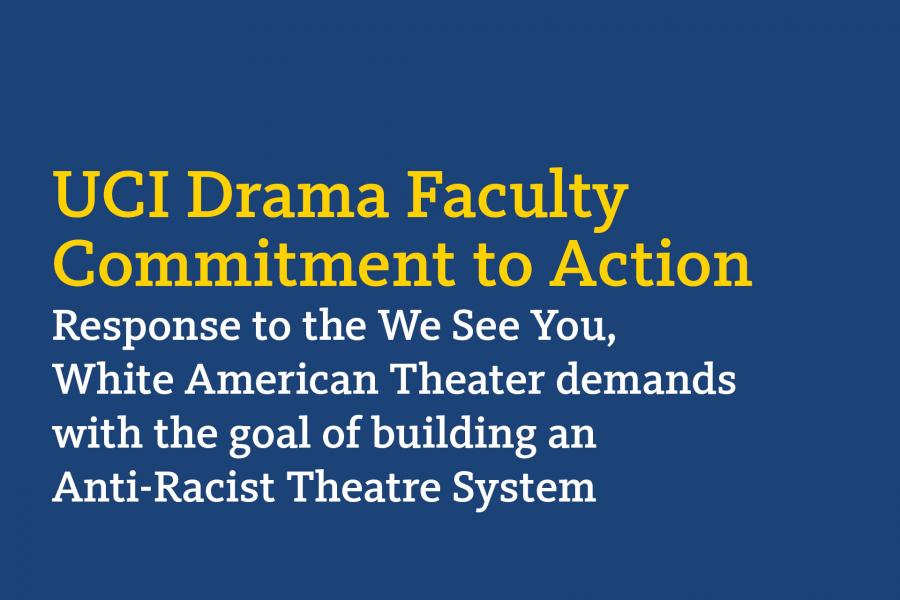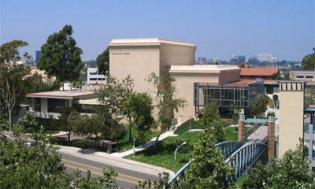UCI Drama Inclusive Action Items
Fall 2021
UCI Drama Faculty commitment to Action in response to the We See You, White American Theater demands with the goal of building an Anti-Racist Theatre System
We, the faculty of University of California, Irvine’s (UCI) Claire Trevor School of the Arts (CTSA) Department of Drama, acknowledge with gratitude the “The Ground We Stand On” artists for their call to action for academic institutions and the American Theater as a whole in We See You, White American Theater (WSYWAT). We also thank our own Students Mobilizing Change (SMC) for their efforts to positively shift the culture within the Claire Trevor School of the Arts towards a more inclusive, more diverse, more equitable, and safer learning environment for all of our students. Our appreciation also extends to our own Office of Inclusive Excellence at UCI who seek to dismantle the systemic barriers of racism and discrimination that have too long been the norm in higher learning and our broader communities. The labor of all of the individuals in these organizations is deeply appreciated.
UCI’s CTSA Department of Drama stands in solidarity with our Black, Indigenous, People of Color (BIPOC), including Asian American Pacific Islander (AAPI), multiracial, and Latine students. We are at a reckoning in our history when we must evaluate our engagement and impact on others. Although we recognize that equity, diversity, and inclusivity issues pertain to many groups of artists, including those with intersectional identities, this statement, like the WSYWAT demands, focuses specifically on issues of racism. As artists who train artists and members of the collective global community, we have been working individually and collectively on a new social contract striving to create anti-racist and anti-oppressive spaces, pushing against the systemic hold of white supremacy, colonialism, misogyny, and patriarchy that negatively impacts us all.
We, (corporately) and individually as faculty, have made mistakes out of ignorance or our own biases that have caused individuals harm within our community (which includes our students, staff, fellow faculty members, and guests) with disproportionate amounts of emotional labor being left to those in marginalized communities. While we can laud certain quantitative data as highlights of our progress towards a more inclusive space, the qualitative experience can tell a different story. Thankfully, we are storytellers with the power to work towards changing our story - this is our commitment to a new path forward. The aforementioned groups have helped us by providing clear demands and ideas for change and we aim to continually evaluate our practices and enact necessary changes for the benefit of all. This has and will continue to include a rigorous evaluation of our practices. We are engaging in centering and documenting our cultural competency, creating support frameworks, establishing essential training, focusing our hiring practices, evaluating our curriculum and pedagogy, diversifying our season planning, reframing our production process, and increasing our transparency.
These actions have taken place or will be enacted in this academic year:
Centering and Documenting Cultural Competency
- We will use this document as a springboard for this process toward creating a statement and/or community agreement that includes a focus on decentralizing whiteness and harm reduction for all disenfranchised, underserved, and underrepresented groups, to be read at all first rehearsals and key meetings.
- We will evaluate all of our current documents and practices, including our mission and code of conduct, with the goal of centering anti-racism and disavowing white supremacy.
- A land acknowledgement will be included at every first rehearsal and every performance centering our focus on equity, diversity, and inclusion through an awareness and acknowledgment of historic and continued injustices. We will encourage all faculty to include such statements in their class syllabi and to be read on the first day of class.
- We will research and create a description of the acquisition and history of the university land, permanently published and accessible to the public.
- We will individually and collectively commit to increase our cultural competency and minoritarian knowledge through additional training and self-study.
Creating Support Frameworks
- We have created and will continue to refine our student support documentation to highlight where students can find basic needs as well as specific support and affiliations.
- We will continue to formalize, promote, and evaluate our protocols of how to address racist incidents with accountability and without retaliation or retribution.
Establishing Essential Training
- Training in Confronting Racism and Anti-Black Racism, Fighting Oppression, Intimacy Direction or Consent Culture, Implicit Bias, Ethnocultural Competency, and Bystander Intervention will be regularly available and encouraged to all faculty, staff, and students.
Focusing our Hiring Practices
- When hiring tenure-track faculty or guest artist positions, we will prioritize hiring individuals who also have a demonstrated commitment to Confronting Racism and Anti-Black Racism, Fighting Oppression, Intimacy Direction or Consent Culture, Implicit Bias, Ethnocultural Competency, and Bystander Intervention.
We will do this by:
- Including specific language in recruitment postings
- Distributing the recruitment postings to organizations with these shared priorities and established ties to potential candidates
- Working with CTSA Equity Advisors and DECADE Mentor(s) to craft interview questions and campus visit agendas that decenter whiteness and white supremacy
- Working with campus resources to identify ways to increase retention of BIPOC faculty members
- We commit to identifying a truly diverse pool of BIPOC candidates when hiring guest artists, staff, and faculty, with the goal of having a majority of finalists being BIPOC with the goal of their retention and success.
- We will continue to hire BIPOC guest artists to support our students.
Evaluating our Curriculum and Pedagogy
- We recognize that ‘the canon’ or more accurately ‘the Western canon’ is a term and concept used to center works produced by generations of theatre artists working in a field built on structural racism, colonialism, and white supremacy, and that continuing to teach only from ‘the canon’ will only serve to perpetuate the primacy of those texts and those authors that hundreds of years of white supremacy has lifted up. We will audit our pedagogy and processes with the goal of incorporating critical racial and cultural thinking in our work and centering the works of BIPOC writers and artists in our productions and our core teaching texts.
- We will seek to train our design students, including but not limited to lighting and costume designers, specifically in the skills to work with BIPOC bodies.
Diversifying our Season Planning
- When considering a season, we will seek to honor cultural specificity in BIPOC stories and be mindful of the harm some stories may elicit. We will also be mindful of whose story is being told and who is telling the story as both have an impact.
- We will value cultural authenticity and representation within the season in terms of those cast in the shows as well as those working on the shows.
- When considering a production, if we cannot cast the show with the required BIPOC performers, we will not produce that show, unless it is within the realm of the artistic intent or approval of those who created or license the work.
Reframing our Production Processes
- We will disrupt the “the show must go on” culture, acknowledging the potential damage that this creates for our community’s bodies, spirits, and mental well-being.
- Within our Mainstage rehearsal process, we will institute a “5-day work week” with Fridays and Sundays off to rest and recover.
- Within our tech process, we will eliminate 10 out of 12s in favor of 8 out of 10s and continue to have Sunday off as a day of rest and recovery.
- Based upon the strong leadership of SMC, we have partnered to create the role of the deputy, to support students when dealing with any challenging issues they face within the production process.
- We will strive to eliminate racially charged language in the workplace.
- When present in the text, we will discontinue racial slurs in rehearsal, performance, and/or ad libs unless central to the actor’s work and in such circumstances, we will establish a clear framework for how and when such words will be used as well as consider the impact seriously in season selection. We will work with the rightsholders of the texts to make appropriate changes, and if we cannot make the changes needed, we will not produce that work.
- We recognize the racism and trauma inherent in black/brown/yellow/red/crip-face as a theatrical technique. In general, we will not engage in black-face, brown-face, yellow-face, red-face, or crip-face casting. If a production requires such casting in order to fulfill the intent of the playwright, all related activity, including but not limited to casting, rehearsals, and performances, will be conducted very deliberately, with consideration for and in recognition of the trauma of black/brown/yellow/red/ crip-face performance, and with the input of outside consultants with specific experience in the respectful employment of this technique.
- We will make certain those teaching or guiding our students in hair and make-up have the proper training in the styling methods and techniques for each individual actor, and specifically for Black actors.
- We recognize that in a production process, the power dynamics of faculty/student and director/company member are often compounded by power imbalances created by structural racist mechanisms. We commit to mindfulness and accountability throughout the production process in order to support the production while also actively working to decenter whiteness and empower our BIPOC community members. If a harmful situation arises, we have established pathways of communication and deputies to assist in the process of addressing and resolving the situation.
- We aim to train and engage dramaturgs to engage in an active role to educate team members, providing fresh and critical views in the process, while neither expecting nor relying on them to bear this burden of responsibility that we collectively all hold.
Increasing Transparency:
- We will equitably compensate BIPOC alumni when asked to speak.
- We will clarify expectations across the board to eliminate any perception of a double standard on how individuals are evaluated.
We are deeply appreciative of our BIPOC community past and present, who have invested disproportionate amounts of emotional labor in making the Department of Drama more equitable. It is at this moment that we make a new and explicit commitment to doing our part as faculty to make UCI a more caring, equitable, and just institution so that current and future members of the Drama community are not additionally harmed due to their race or ethnic status. This is just the start. We aim to continue this process with regular evaluations, with a goal of being leaders of Inclusive Excellence, addressing racism in our own spaces first as well as in the American Theater as a whole.
To these actions, we are committed as first steps in building Anti-Racist Theatre Systems at UCI and beyond. The Drama faculty overwhelmingly approved and support this document.


